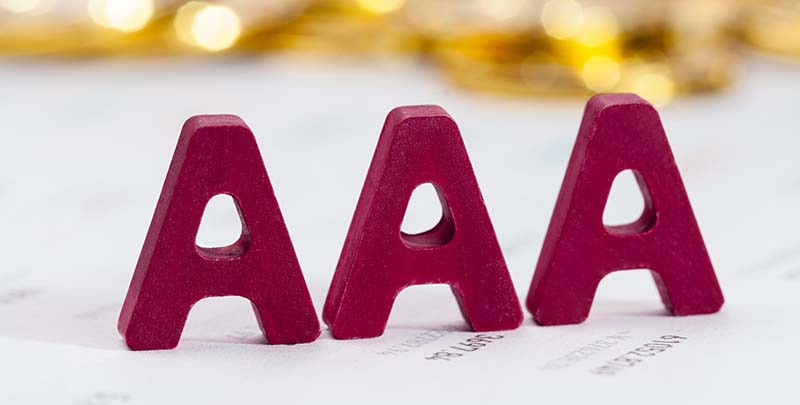When you invest your hard-earned money into an investment, the safety of your funds is often the top priority.
Additionally, you don't want to compromise on the potential returns on your investments. AAA Bonds have the highest
credit rating possible and provide promising returns.
What is an AAA bond?
'AAA' is a credit rating assigned by credit rating agencies like CRISIL. It is the highest rating in a spectrum
between AAA and D. AAA Bonds have achieved this rating, meaning that the issuer's risk of default is very low.
Several factors, like the issuer's financial position, cash flow strength, and collateral assets, are considered
while assigning this rating. As the issuer's financial position changes, the ratings can also change. For instance,
a
bond could lose its AAA status if the credit rating agency reduces its rating.
What is AAA bond yield?
'Bond yield' is the return that you earn from the bond. Generally, instruments that have a high risk involved provide
higher returns. As AAA bonds are safe investments, their yields are relatively low. However, you can expect a steady
income from these bonds because of the low risk involved.
Benefits of AAA bonds
- Low risk of default: AAA Bond issuers are considered financially strong, so the possibility of
them not paying their dues is quite remote.
- Liquidity: Many are eager to buy these bonds in the market, making your investment a highly
liquid asset.
- Reduced price changes: As the price of these bonds is relatively stable, the price fluctuations
would be manageable.
- Security: AAA Bonds provide a sense of security for risk-averse investors.
Types of AAA bonds
- Secured Bonds: These bonds have collateral. Issuers back them with high-value assets like real
estate, machinery, or equipment. You can claim these assets in case of a default.
- Unsecured Bonds: These bonds do not have collateral like Secured Bonds. As an investor, you
have
lesser protection and must rely on the issuer's creditworthiness.
Alternatives to AAA bonds
Although AAA bonds provide the highest safety in the bond market, you can invest in alternative bonds with slightly
lower ratings. Generally, bonds with a rating of BBB and above are considered investment-worthy. Consider investing
in
bonds issued by blue-chip or public-sector companies for enhanced safety. You can also explore low-risk investment
options like Fixed Deposits.
Investing your money partially in AAA Bonds and other investments is a good idea for diversification. Open an Axis Direct Trading and Demat Account to invest in
multiple securities digitally from one account. This 3-in-1 account is a Savings, Demat and Trading Account for all
your investment needs.
Conclusion
AAA-rated bonds provide a sense of safety in today's uncertain market. The default risk is usually low, and the
returns are considered good, if not the best in the market. However, you must note that credit ratings are subject
to
change. Monitor the performance of the bond issuer and track the updated ratings issued by rating agencies.
FAQs
Why is credit rating critical?
A credit rating is important because it shows how creditworthy the issuer of a security is. You can use this
rating
to judge the security's default risk.
What does the AAA credit rating mean?
An AAA rating means the security has a shallow risk of default.
Do AAA bonds have high interest rates?
AAA Bonds have lower interest rates compared to other high-risk securities.
Is BBB+ a good credit rating?
Although lower than AAA, BBB+ is considered an investment-grade credit rating.
Disclaimer: This article is for information purpose only. The views expressed in this article are personal and do not necessarily constitute the views of Axis Bank Ltd. and its employees. Axis Bank Ltd. and/or the author shall not be responsible for any direct / indirect loss or liability incurred by the reader for taking any financial decisions based on the contents and information. Please consult your financial advisor before making any financial decision.







